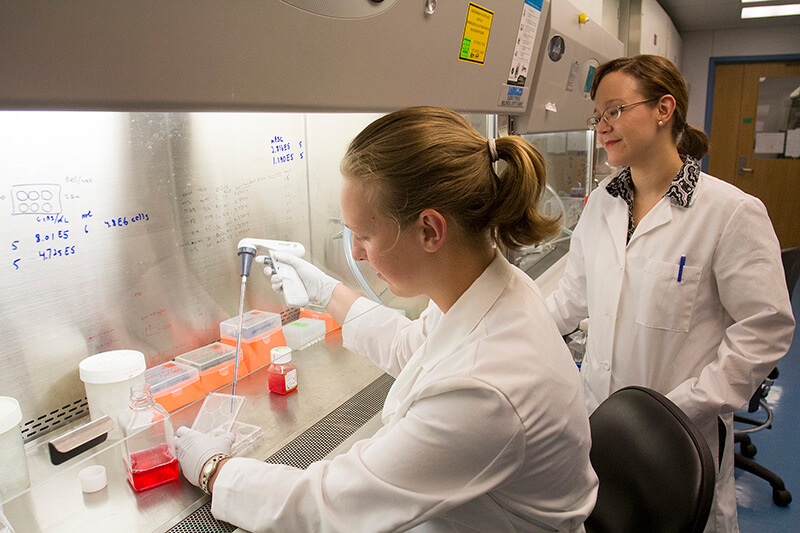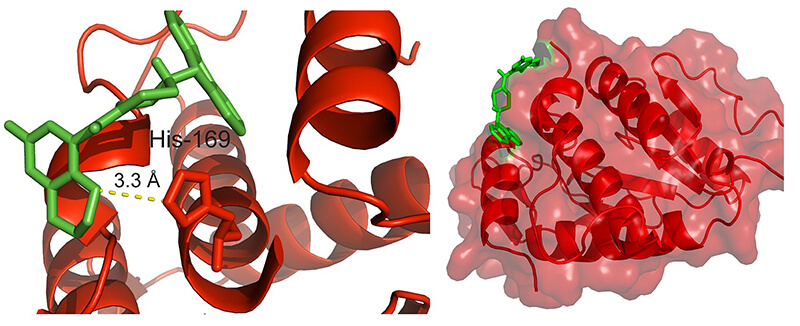October 3, 2018
Cancer researchers at Purdue aim to take the ‘accelerator’ off aggressive prostate and other deadly tumors
 Purdue University associate professor Marxa Figueiredo, right, worked with students to develop a drug to help cancer patients. (Image provided)
Download image
Purdue University associate professor Marxa Figueiredo, right, worked with students to develop a drug to help cancer patients. (Image provided)
Download image
WEST LAFAYETTE, Ind. – Purdue University researchers are studying ways to make prostate cancer, ranked as the second most common and second most fatal cancer among men by the American Cancer Society, less lethal by making it less aggressive.
The Purdue team has developed a drug to target the laminin receptor (37/67 LR), a membrane protein that when overexpressed can promote the growth of cancer cells and tumors. The researchers say it also could help fight other types of aggressive cancers, including pancreatic, colon, liver and breast.
“We are trying to take cancer’s foot off the accelerator by targeting this receptor,” said Marxa Figueiredo, a Purdue associate professor of basic medical sciences, who helped lead the research team.
Purdue’s drug binds to the laminin receptor and cuts its ability to help tumors grow and to communicate with blood vessels, which are the lifeblood for cancer cells and tumors. The Purdue compound mimics anti-proliferative and anti-angiogenesis pathways to inhibit cancer cell viability, proliferation, migration, as well as inhibits the formation of new blood vessels.
 This image shows two poses for a new compound, discovered at Purdue University, docking and targeting the laminin receptor protein for cancer therapy. (Image provided)
Download image
This image shows two poses for a new compound, discovered at Purdue University, docking and targeting the laminin receptor protein for cancer therapy. (Image provided)
Download image
The work also aligns with Purdue's giant leaps celebration, acknowledging the university’s global advancements made in health, longevity and quality of life as part of Purdue’s 150th anniversary. This is one of the four themes of the yearlong celebration’s Ideas Festival, designed to showcase Purdue as an intellectual center solving real-world issues. Solutions such as this drug are also a focus of Purdue’s Discovery Park District.
The Purdue approach is unique because it provides a single drug to perform multiple functions in cancer treatment. The drug also shows promise for treating similar cancers in pets.
“It is incredibly rewarding and exciting to potentially provide new options for people and for animals dealing with aggressive tumors,” Figueiredo said.
Figueiredo worked with her former graduate student, Sam Umbaugh, to develop this drug. She is currently collaborating with Herman Sintim, Purdue's Drug Discovery Professor of Chemistry, to create different versions of the drug that are more effective against various types of cancers.
Researchers had filed a patent with the Purdue Office of Technology Commercialization and the technology is available for licensing.
About Purdue Office of Technology Commercialization
The Purdue Office of Technology Commercialization operates one of the most comprehensive technology transfer programs among leading research universities in the U.S. Services provided by this office support the economic development initiatives of Purdue University and benefit the university's academic activities. The office is managed by the Purdue Research Foundation, which received the 2016 Innovation and Economic Prosperity Universities Award for Innovation from the Association of Public and Land-grant Universities. For more information about funding and investment opportunities in startups based on a Purdue innovation, contact the Purdue Foundry at foundry@prf.org. For more information on licensing a Purdue innovation, contact the Office of Technology Commercialization at otcip@prf.org. The Purdue Research Foundation is a private, nonprofit foundation created to advance the mission of Purdue University.
Writer: Chris Adam, 765-588-3341, cladam@prf.org
Source: Marxa Figueiredo, mlfiguei@purdue.edu

